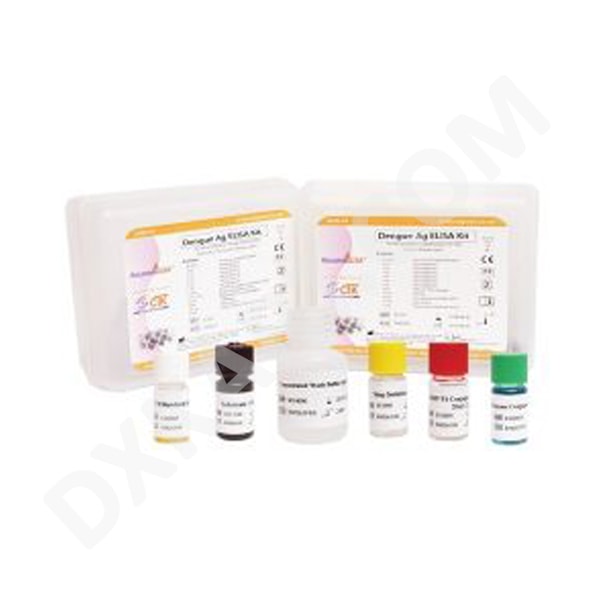
CTK Biotech, USA
Dengue Ag (NS1) ELISA Kit
₹ 15000
₹ 7806
Pack Size:96 Test/Kit

CTK Biotech, USA
Pack Size:96 Test/Kit
The RecombiLISA Dengue Ag (NS1) ELISA Kit is a solid-phase, enzyme linked immunosorbent assay that was developed using the antibody sandwich technique. The two main kit components are: 1) A 96 breakable well plate with the solid microwells pre-coated with rabbit anti- Pan Dengue NS1 antibody 2) A conjugate solution composed of antibodies against Dengue NS1 antigen conjugated with horseradish peroxidase (HRP-anti-dengue NS1 conjugates) This test is intended for the qualitative detection of dengue NS1 antigen (DEN1, 2, 3, 4) in human serum or plasma. It is intended to be used by professionals as an aid in the early detection of dengue virus infection . Any interpretation or use of this test result must also rely on other clinical findings as well as on the professional judgment of healthcare providers. Recommended for use: Any person presenting with clinical signs or symptoms consistent with acute dengue infection or dengue fever including: high fever, severe headaches, pain behind the eyes, severe joint and muscle pain, fatigue, nausea, vomiting, and/or skin rash. Dengue NS1 antigen is released into the blood during viral replication in an infected patient, and is detectable from the first day after the onset of fever up to Day 9. NS1 antigen can be identified before the formation of antibodies, thus making it a beneficial biomarker for early detection of dengue infection, allowing for prompt management of dengue fever.
TEST PRINCIPLE The RecombiLISA Dengue Ag ELISA Test is a solid-phase enzyme-linked immunosorbent assay based on the principle of the antibody sandwich technique for the detection of dengue NS1 antigen in human serum or plasma. The RecombiLISA Dengue Ag ELISA Test is composed of two key components: 1) Solid microwells pre-coated with rabbit anti-pan dengue NS1 antibody, 2) Liquid conjugates composed of monoclonal antibodies recognize NS1 antigen from DEN1, 2, 3 and 4 conjugated with horseradish peroxidase (HRP-antidengue NS1 Conjugates). During the assay, the test specimen is first incubated in the coated microwell. The dengue NS1 antigen, if present in the specimen, binds to the antibody coated on the microwell surface, and any unbound specimen is then removed by a wash step. During a second incubation with the HRP-anti-dengue NS1 conjugates, the dengue NS1 antigen absorbed on the surface of microwell binds to the conjugates, forming a conjugate complex. Unbound conjugates are then removed by washing. After addition of the TMB substrate, the presence of the conjugate complex is shown by development of a blue color resulting from a reaction between the enzyme and substrate. This reaction is then quenched by addition of the Stop Solution, and the absorbance value for each microwell is determined using a spectrophotometer at 450/620-690 nm.